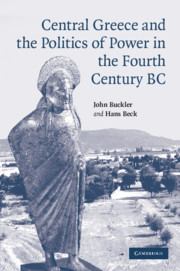Book contents
- Frontmatter
- Contents
- List of maps
- Preface
- Acknowledgments
- List of abbreviations
- Prologue
- Part I ALLIANCE
- Part II HEGEMONY
- Chapter 6 The re-establishment of the boiōtarchia (378 BC)
- Chapter 7 The battle of Tegyra, 375 BC
- Chapter 8 Plutarch on Leuctra
- Chapter 9 Alliance and hegemony in fourth-century Greece: the case of the Theban Hegemony
- Chapter 10 Xenophon's speeches and the Theban Hegemony
- Chapter 11 The phantom synedrion of the Boeotian Confederacy, 378–335 BC
- Chapter 12 Boeotian Aulis and Greek naval bases
- Chapter 13 Epaminondas and the new inscription from Cnidus
- Part III DOMINATION
- Epilogue
- Glossary
- References
- Index
Chapter 8 - Plutarch on Leuctra
from Part II - HEGEMONY
Published online by Cambridge University Press: 22 September 2009
- Frontmatter
- Contents
- List of maps
- Preface
- Acknowledgments
- List of abbreviations
- Prologue
- Part I ALLIANCE
- Part II HEGEMONY
- Chapter 6 The re-establishment of the boiōtarchia (378 BC)
- Chapter 7 The battle of Tegyra, 375 BC
- Chapter 8 Plutarch on Leuctra
- Chapter 9 Alliance and hegemony in fourth-century Greece: the case of the Theban Hegemony
- Chapter 10 Xenophon's speeches and the Theban Hegemony
- Chapter 11 The phantom synedrion of the Boeotian Confederacy, 378–335 BC
- Chapter 12 Boeotian Aulis and Greek naval bases
- Chapter 13 Epaminondas and the new inscription from Cnidus
- Part III DOMINATION
- Epilogue
- Glossary
- References
- Index
Summary
The 1970s saw renewed interest in the battle of Leuctra and its place in the history of Greek warfare. In 1970 J. K. Anderson published a detailed study of the battle, the first since 1926, and in 1972 G. L. Cawkwell emphasized the revolutionary aspects of Epaminondas' tactics. Both scholars have given greater credence to Plutarch's testimony in the Life of Pelopidas than the standard treatment of J. Wolter, who flatly claimed that Plutarch's account was “sachlich unmöglich.” Wolter's scepticism had been adumbrated by H. Delbrück, the eminent student of military history, who concluded that Plutarch's narrative on Leuctra was “unbrauchbar.” It seems appropriate, then, to re-examine Plutarch's account of the battle to determine how he envisaged the action and whether he correctly understood it.
The first step is to determine the source from which Plutarch derived his information. On this point Wolter confessed ignorance, but H. D. Westlake has suggested that Plutarch drew upon Callisthenes' Hellenica for some parts of the Pelopidas. A good case can be made for Plutarch's reliance on Callisthenes, especially for military affairs, specifically for Sphodrias' raid on the Piraeus in 378, and the battles of Tegyra, Leuctra, and Mantinea.
In his account of Sphodrias' ill-conceived raid, Plutarch comments on Sphodrias' character, describing him as “rather weak in judgment and full of vain hopes and senseless ambition” (Pel. 14, 2). This is obviously a paraphrase of Callisthenes' verdict: “he was very simple-minded and empty-headed in comparison with what was expected of him” (FGrH 124 f 9).
- Type
- Chapter
- Information
- Publisher: Cambridge University PressPrint publication year: 2008
- 1
- Cited by

